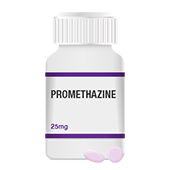

Promethazine
 Promethazine is in a group of drugs called phenothiazines (FEEN-oh-THYE-a-zeens). It works by changing the actions of chemicals in your brain. Promethazine also acts as an antihistamine. It blocks the effects of the naturally occurring chemical histamine in your body. Promethazine is used to treat allergy symptoms such as itching, runny nose, sneezing, itchy or watery eyes, hives, and itchy skin rashes. It also prevents motion sickness, and treats nausea and vomiting or pain after surgery. It is also used as a sedative or sleep aid. Promethazine is not for use in treating symptoms of asthma, pneumonia, or other lower respiratory tract infections.
Promethazine is in a group of drugs called phenothiazines (FEEN-oh-THYE-a-zeens). It works by changing the actions of chemicals in your brain. Promethazine also acts as an antihistamine. It blocks the effects of the naturally occurring chemical histamine in your body. Promethazine is used to treat allergy symptoms such as itching, runny nose, sneezing, itchy or watery eyes, hives, and itchy skin rashes. It also prevents motion sickness, and treats nausea and vomiting or pain after surgery. It is also used as a sedative or sleep aid. Promethazine is not for use in treating symptoms of asthma, pneumonia, or other lower respiratory tract infections.
Buy Promethazine 25 mg
| Quantity | Price | Order Button |
| 90 Pills | 109.00 |
Promethazine FAQ
Your order will arrive between 1-3 business days after verifying your order by phone.
Nearly All packages are delivered by USPS. A minority of orders may be delivered through other smaller carriers.
We charge a standard $19.95 for Priority Mail and $39.95 for Express Mail for all orders within the 48 continental U.S. states.
We accept Visa, MasterCard, and ACH (e-checks)
Promethazine Information
How should I take promethazine?
Take promethazine exactly as prescribed by your doctor. Follow all directions on your prescription label. Your doctor may occasionally change your dose to make sure you get the best results. Do not take this medicine in larger or smaller amounts or for longer than recommended. Promethazine is often taken at bedtime or before meals. For motion sickness, promethazine is usually started within 1 hour before traveling. When used for surgery, promethazine is usually taken the night before the surgery. How often you take this medicine and the timing of your dose will depend on the condition being treated. Measure liquid medicine with the dosing syringe provided, or with a special dose-measuring spoon or medicine cup. If you do not have a dose-measuring device, ask your pharmacist for one. If a child is using this medicine, tell your doctor if the child has any changes in weight. Promethazine doses are based on weight in children, and any changes may affect your child's dose. Call your doctor if your symptoms do not improve, or if they get worse while using promethazine. This medicine can cause unusual results with certain medical tests. Tell any doctor who treats you that you are using promethazine. Store at room temperature away from moisture, heat, and light.
What happens if I miss a dose?
Take the missed dose as soon as you remember. Skip the missed dose if it is almost time for your next scheduled dose. Do not take extra medicine to make up the missed dose.
What happens if I overdose?
Overdose symptoms may include overactive reflexes, loss of coordination, severe drowsiness or weakness, fainting, dilated pupils, weak or shallow breathing, or seizure (convulsions). Seek emergency medical attention or call the Poison Help line at 1-800-222-1222.
What should I avoid while taking promethazine?
This medicine may impair your thinking or reactions. Be careful if you drive or do anything that requires you to be alert. Avoid getting up too fast from a sitting or lying position, or you may feel dizzy. Get up slowly and steady yourself to prevent a fall. Drinking alcohol can increase certain side effects of promethazine. Avoid exposure to sunlight or tanning beds. Promethazine can make you sunburn more easily. Wear protective clothing and use sunscreen (SPF 30 or higher) when you are outdoors.
Promethazine side effects
Get emergency medical help if you have any of these signs of an allergic reaction: hives; difficult breathing; swelling of your face, lips, tongue, or throat. Stop using promethazine and call your doctor at once if you have: severe drowsiness, weak or shallow breathing; a light-headed feeling, like you might pass out; confusion, agitation, hallucinations, nightmares; seizure (convulsions); fast or slow heartbeats; jaundice (yellowing of the skin or eyes); uncontrolled muscle movements in your face (chewing, lip smacking, frowning, tongue movement, blinking or eye movement); easy bruising or bleeding (nosebleeds, bleeding gums); sudden weakness or ill feeling, fever, chills, sore throat, mouth sores, red or swollen gums, trouble swallowing; or severe nervous system reaction - very stiff (rigid) muscles, high fever, sweating, confusion, fast or uneven heartbeats, tremors, feeling like you might pass out. Side effects such as confusion and severe drowsiness may be more likely in older adults.
Common promethazine side effects may include: drowsiness, dizziness; ringing in your ears; double vision; feeling nervous; dry mouth; or tired feeling, sleep problems (insomnia). This is not a complete list of side effects and others may occur. Call your doctor for medical advice about side effects.
Promethazine dosing information
Usual Adult Dose of Promethazine for Anaphylaxis:
Parenteral: 25 mg IV or IM once, followed by close observation for response. This dose may be repeated within 2 hours if needed. Oral therapy should be started as soon as feasible if continued medication is required. Oral: 25 mg orally once. This dose may be repeated every 4 hours as needed. Rectal: 25 mg administered rectally once. This dose may be repeated every 4 hours as needed.
Usual Adult Dose for Allergic Reaction:
Oral or rectal: 12.5 mg before meals and 25 mg at bedtime, if necessary. Alternatively, a single 25 mg dose given at bedtime or 6.25 mg to 12.5 mg three times daily. IM or IV: 25 mg, may repeat in 2 hours if necessary.
Usual Adult Dose of Promethazine for Allergic Rhinitis:
Parenteral: 25 mg IV or IM, followed by close observation for response. This dose may be repeated within 2 hours if needed. Oral therapy should be started as soon as feasible if continued medication is required. Oral: 25 mg at bedtime. Alternatively, 12.5 mg may be administered before the evening meal and again at bedtime for antihistamine effects. Rectal: 25 mg at bedtime. Alternatively, 12.5 mg may be administered before the evening meal and again at bedtime for antihistamine effects. The safety of promethazine for long-term treatment of allergic rhinitis has not been established.
Usual Adult Dose for Light Sedation:
Parenteral: 25 mg IV or IM once, followed by close observation for response. An additional dose, up to 50 mg, may be administered to achieve the desired clinical effect. Oral: 25 mg once. An additional dose, up to 50 mg, may be administered to achieve the desired clinical effect. Rectal: 25 mg once. An additional dose, up to 50 mg, may be administered to achieve the desired clinical effect.
Usual Adult Dose of Promethazine for Motion Sickness:
Oral or rectal: 25 mg 30 to 60 minutes before departure, then every 12 hours as needed.
Usual Adult Dose for Nausea/Vomiting:
Oral, rectal, IM or IV: 12.5 to 25 mg every 4 to 6 hours as needed.
Usual Adult Dose of Promethazine for Opiate Adjunct:
Oral, rectal, IM or IV: 25 to 50 mg every 4 hours as needed to augment the effects of concomitantly administered opioids.
Usual Adult Dose for Urticaria:
Parenteral: 25 mg IV or IM, followed by close observation for response. This dose may be repeated within 2 hours if needed. Oral therapy should be started as soon as feasible if continued medication is required. Oral: 25 mg at bedtime. Alternatively, 12.5 mg may be administered before the evening meal and again at bedtime for antihistamine effects. Rectal: 25 mg at bedtime. Alternatively, 12.5 mg may be administered before the evening meal and again at bedtime for antihistamine effects.
Usual Adult Dose for Sedation:
Oral, rectal, IM or IV: 25 to 50 mg/dose.
Usual Adult Dose for Vertigo:
Acute Vertigo: Initial: 25 mg IM, IV, orally, or by suppository. Maintenance: 12.5 to 50 mg every 4 to 8 hours. Maximum daily dose should not exceed 75 mg.
Usual Pediatric Dose for Allergic Reaction:
Greater than or equal to 2 years: oral or rectal: 0.1 mg/kg/dose every 6 hours during the day and 0.5 mg/kg/dose at bedtime as needed.
Usual Pediatric Dose for Motion Sickness:
Greater than or equal to 2 years: Oral or rectal: 0.5 mg/kg (not to exceed 25 mg) 30 minutes to 1 hour before departure, then every 12 hours as needed.
Usual Pediatric Dose for Nausea/Vomiting:
Greater than or equal to 2 years: oral, rectal, IM or IV: 0.25 to 1 mg/kg/dose (not to exceed 25 mg) 4 to 6 times a day as needed.
Usual Pediatric Dose for Sedation:
Greater than or equal to 2 years: Sedation: oral, IM, IV, or rectal: 0.5 to 1 mg/kg/dose (not to exceed 25 mg) every 6 hours as needed. Greater than or equal to 2 years: Preoperative analgesia/hypnotic adjunct: IM, IV: 1.1 mg/kg once in combination with an analgesic or hypnotic (at reduced dosage) and with an atropine-like agent (at appropriate dosage). Note: Promethazine dosage should not exceed half of suggested adult dosage.
What other drugs will affect promethazine?
Using this medicine with other drugs that make you sleepy or slow your breathing can cause dangerous or life-threatening side effects. Ask your doctor before taking promethazine with a sleeping pill, narcotic pain medicine, muscle relaxer, or medicine for anxiety, depression, or seizures. Other drugs may interact with promethazine, including prescription and over-the-counter medicines, vitamins, and herbal products. Tell each of your health care providers about all medicines you use now and any medicine you start or stop using.
Promethazine Search Terms
Where to buy promethazine overnight delivery. Mail order promethazine from usa pharmacies. Purchase cheap promethazine pills with free prescription. How to get promethazine online usa drugstores. Best place to buy real promethazine antihistamine.



